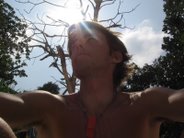Well all, I'm back. Just about. As of now I'm still in the lovely, commodified, tourist kitsch-drenched city of Mae Hong Son, but I will be back in Chiang Mai later today. Say, six o'clock or so. We wrapped up our tour of P'gaganyaw (pronounced: Ba-Gin-Yaw, the proper term for the Karen hill tribe) villages in Mae Hong Son province, which is in the Northeast of Thailand. I have absolutely no idea how to condense such an incredible, complex, insightful experience into a handful of words, so bear with me. Basically, the P'gaganyaw are a hill tribe, of which there are many, but they are the largest, and also most politically empowered. However, they still face face a fair amount of conflict with the government. They live in the mountains and still maintain many elements of their traditional way of life, such as weaving and rotational agriculture. Rotational agriculture is a fairly major one. You may know it as slash and burn agriculture, and probably learned about it (and maybe how "bad" it is in middle school social studies). Well, it's not bad, and in fact it is amazingly ecologically sustainable, as well as often providing the P'gaganyaw people with a healthy, self-sufficient livelihood. So back off. Perhaps the biggest lesson I learned, which I didn't necessarily expect to get, was in seeing how they are able to negotiate a nuanced and empowering relationship with modern forces, such as technology, culture, and government. They do not need to be shielded from these forces, as many Westerners like to think, reducing the people and their culture to a two-dimensional romanticized charicature. Howeveer, nor should they be forced to modernize and develop along traditional top-down models, which has often been the other, more common, alternative. Rather, living in these villages, seeing how they incorporate everything from televsision to GPS to modern materials to Thai schools to government positions (and so on down the list) into their so-called "traditional" way of life just convinced me of their ability as people to take charge of these issues, and what's more, in so doing, strengthening and empowering themselves politically, culturally and ecologically. This might all seem uninteresting or unremarkable to you all, but coming away with this understanding is fairly significant to me.
As far as the non-"academic" side of things, which is impossible to really separate from everything else, the trip was amazing. I stayed with a total of five wonderful P'gaganyaw families. We stayed in the villages (in order): Hua Nam, Nam Hoo, Huay Koong, Huay Hee, and Huay Tong Kaw. We stayed in each village for two to four nights, spending the days either in the field learning from village members about their ecological systems or political structures, or simply spending the day with our families, harvesting rice or just idling the time away. We would then hike for six to eight hours in between villages, going through spectacular green mountains or wading through rivers. My time was filled with so many little things that are just impossible to recount in any fair way. But just to give you an idea: there was a cat who I'm sure was convinced it was wearing an invisibility cloak, a seven year old boy with an unwieldy passion for rockpaperscissors, teaching English with Nick and Aaron in a school, herds of water buffalo roaming around and two AM, being freezing cold in Thailand, eating flying squirrel and chicken organs (rather, avoiding them at all costs), communicating surprisingly well when Thai was a second language to all involved, climbing Doi Pui (the highest point in the province), swimmin in rivers, a ridiculous fat and sassy host family, the father of which was an important governmental representative for the village but nonetheless wore a huge fleece blanket as a do-rag or wandered around in nothing but a teal spandex briefs, amazing stars (stellar, even), an adorable two year old boy with a cleft pallette named Hero, our hilarious and unfathomably jovial Thai guide Pi Wissain who looked like a forty-year-old Thai Ben Levick, and so on and so forth.
And whew. What more can I say. As much as I have loved it here, I long for Chiang Mai. And I am so happy to say that I will be there for the next two months, which will encompass my internship and a radical activist organization and my winter break, with adventures and yoga to fill in the gaps.
Here's to Rumsfeld gettin what he had coming to him, may he suffer every ounce of it. Cheers!
Subscribe to:
Post Comments (Atom)

3 comments:
welcome home. i know you have tons to share. that seemed like a really long time. love,mom
Sounds amazing Noah. I wish I was there, but here at the same time? Tell me about your internship when you get a chance (maybe drop an email to your long-lost friend here). Life is good here in Nairobi. Struggling to find an internship/ICRP. But gettin' by and troopin' along.
Salama (peace in Kiswahili),
Stacy
That seemed like a really long trip! Did it feel really long for you? Sounds amazing, in a nut shell.
Post a Comment